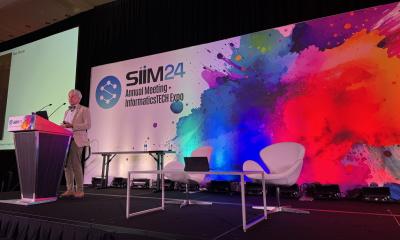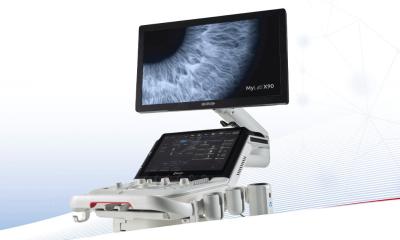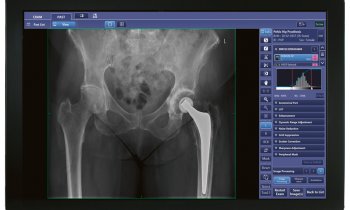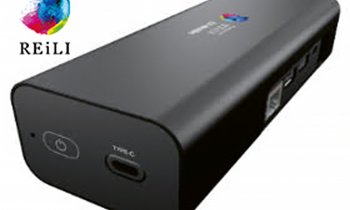Article • Open source framework
Here comes the AI healthcare era
Although the Covid-19 pandemic has put wind behind the sails of AI in healthcare, domain specific tools are needed to build and deploy AI and harness its power in data handling, training workflows and reproducibility of state-of-the-art approaches, according to Kimberly Powell, NVIDIA Vice President of Healthcare at the technology firm NVIDIA, presenter of a public address at RSNA 2020.
Image source: MONAI/NVIDIA

‘This and next year are {and will be} defining moments in healthcare,’ Powell, believes. ‘I’m calling it the AI healthcare era. With the devastation of the global pandemic… the world has catalysed its adoption of the most modern computing technologies. The AI healthcare era is not five or ten years away; it’s right here,’ Powell stressed, prior to the 19th annual meeting of the Radiological Society of North America (RSNA).
Despite the Covid-19 economic fallout, rising investment in healthcare start-ups went up in 2020, emphasising the level of interest. In the third quarter of 2020 alone, around $2 billion was raised in 60 deals involving companies affiliated with top accelerators and incubators in life sciences – shown in data gathered by CipherBio, a database that connects life science companies with investors.
AI brings automation, assistance, innovation and new capabilities. AI is software that rides on software. However, Powell points out that, being domain-specific, AI needs appropriate tools. ‘The nature of the domain data implies that we need to create domain specific tools to build and deploy AI applications for healthcare.’
Domain tools adoption
NVIDIA is a multinational technology company that designs graphics processing units(GPUs) for the gaming and professional markets, as well as System on a Chip (SoC) units for the mobile computing and automotive market. The company has taken an interest in healthcare and, to support healthcare research with AI, recently announced its plan to build the most powerful computer in Cambridge, by the end of the year.
In parallel, NVIDIA is building its Medical Open Network for AI (MONAI), a domain-optimised, open-source framework for healthcare, which uses PyTorch, an open source machine-learning library used for computer vision and natural language processing. Launched last April, MONAI is ready for production with the upcoming release of the NVIDIA Clara application framework for AI-powered healthcare and life sciences. Powell reports that the framework has been adopted by leading healthcare research institutions to enable the development of AI for medical imaging with industry-specific data handling, high-performance training workflows and reproducible reference implementations of state-of-the-art approaches.
Recommended article
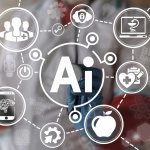
Article • AI in clinical practice
Hospitals must think big, small and new
AI in healthcare has been a trending, sometimes head-spinning topic for a few years – and, with the COVID-19 pandemic, clinicians have been presented with a whole new range of AI products that may or may not meet their needs. When it comes to choosing one’s own set of tools, which criteria should prevail?
MONAI for imaging has been adopted for imaging by the German Cancer Research Centre (DKFZ), King’s College London, Massachusetts General Hospital (MGH), Stanford University and Vanderbilt University. Users have given positive feedback, the company reports. ‘Monai is becoming the PyTorch of healthcare, paving the way for closer collaboration between data scientists and clinicians,’ confirmed Dr Jayashree Kalpathy-Cramer, director of the QTIM lab at the Athinoula A Martinos Centre for Biomedical Imaging at MGH, quoted in a NVIDIA press release. Additionally, Dr Bennett Landman of Vanderbilt University is quoted: ‘Monai is quickly becoming the go-to deep learning framework for healthcare. Getting from research to production is critical for the integration of AI applications into clinical care.’
Pre-trained models for developers
NVIDIA has also released over 20 pre-trained models for developers, including ones recently developed for Covid-19, as well as the latest training optimisations on NVIDIA DGX A100 GPUs that provide up to a six-fold acceleration in training turnaround time, the company reports. ‘Pre-trained models are an incredible starting point for developers working in this domain. They don’t have to train large date corpuses, but small data corpuses that they can adapt to a particular research problem,’ Powell points out.
Monai, an open source community-led Pytorch specific framework, also features data loaders, network architectures and training evaluation engines that allow for speed up and reproducible research, the company adds. ‘In this framework, NVIDIA works with approximately 50 contributors across eight working groups to advance some of the main issues of AI implementation in healthcare.’
Annotation and federated learning to fight Covid-19
We all know radiologists’ time is precious and this is an amazing advancement of the platform
Kimberly Powell
A new feature in the company’s AI-assisted annotation system enables visualisation of annotations in real time and automatically full volume segment, boosting interactivity by reducing the number of clicks. The Deep Grow 3-D model enables radiologists to label complex 3-D CT data in a tenth of the clicks compared to the traditional time-consuming method of segmenting an organ or lesion image by image, or slice by slice, which can be up to 250 clicks for a large organ such as the liver, Powell explained. ‘We all know radiologists’ time is precious and this is an amazing advancement of the platform. (It is) really helping us to unlock all of that fantastic and rich imaging data for training more and more models going forward.’
AI-assisted annotation was recently used to label the public Covid-19 CT dataset published by The Cancer Imaging Archive at the USA’s National Institutes of Health. This labelled dataset was then used in the MICCAI-endorsed Covid-19 Lung CT Lesion Segmentation Challenge.
Recommended article
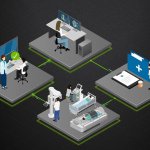
News • NVIDIA at RSNA
Federated learning brings AI with privacy to hospitals
With over 100 exhibitors at the annual Radiological Society of North America conference using NVIDIA technology to bring AI to radiology, 2019 looks to be a tipping point for AI in healthcare. Despite AI’s great potential, a key challenge remains: gaining access to the huge volumes of data required to train AI models while protecting patient privacy.
Recently, the company also collaborated with 20 hospitals, internationally, to develop a generalised AI model for Covid-19 patients using federated learning. The resulting EXAM model, co-developed with the National Institutes of Health (NIH), predicts oxygen requirements in Covid-19 patients and is available on the software registry of the NGC, the company’s software hub for accelerating AI applications.
‘EXAM is a federated learning model where we use every-day X-ray and lab tests to predict, within 24 hours after you receive an exam, what kind of supplement of oxygen you might need – information that could be critically important,’ Powell points out. The model is being evaluated for clinical validation at Mount Sinai Health System, New York, Diagnósticos da America SA, Brazil, NIHR Cambridge Biomedical Research Centre, UK and the NIH. (MR)
Profile:
Kimberly Powell is vice president of the healthcare division at the technology firm NVIDIA, in which she is responsible for its worldwide healthcare business, including hardware and software platforms for accelerated computing, AI and visualisation that power the ecosystem of medical imaging, life sciences, drug discovery and healthcare analytics.
30.11.2020



